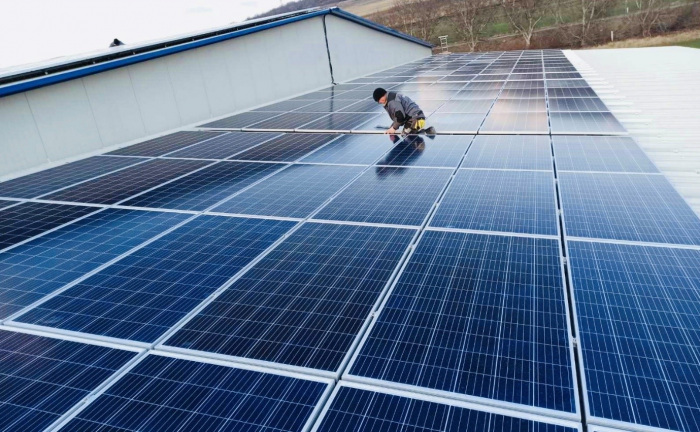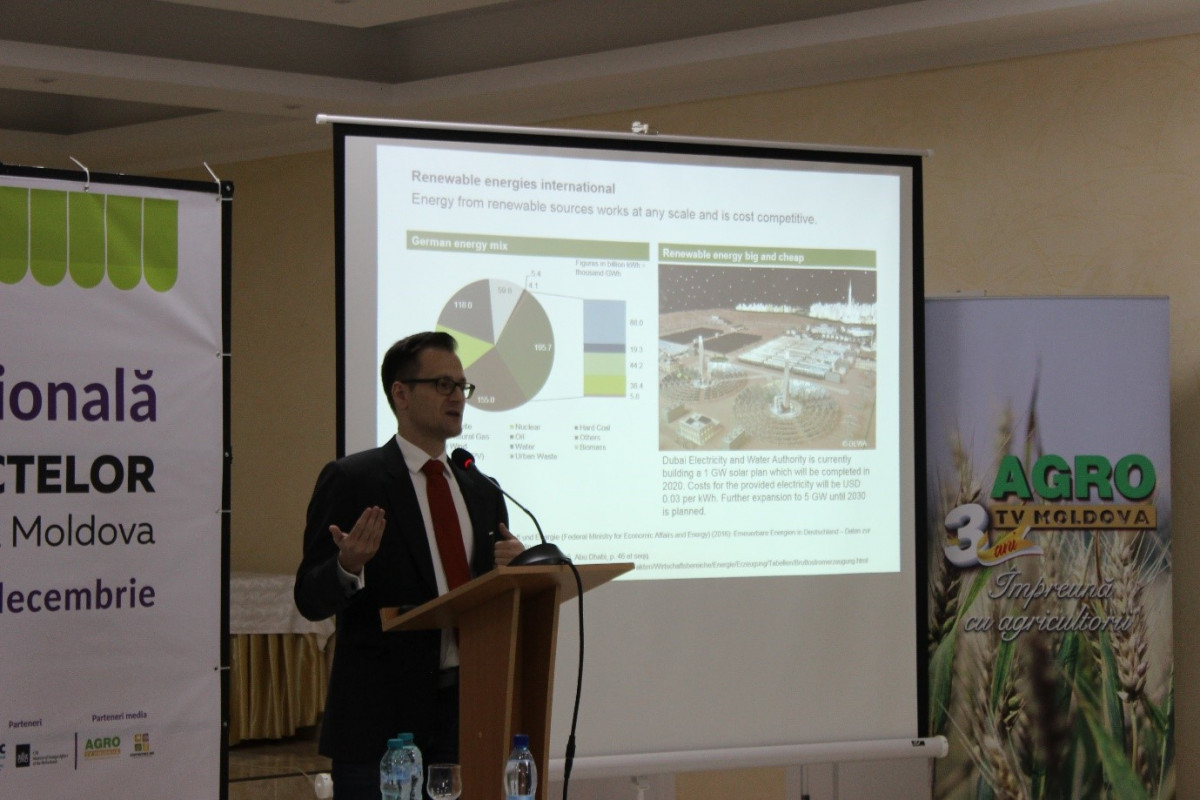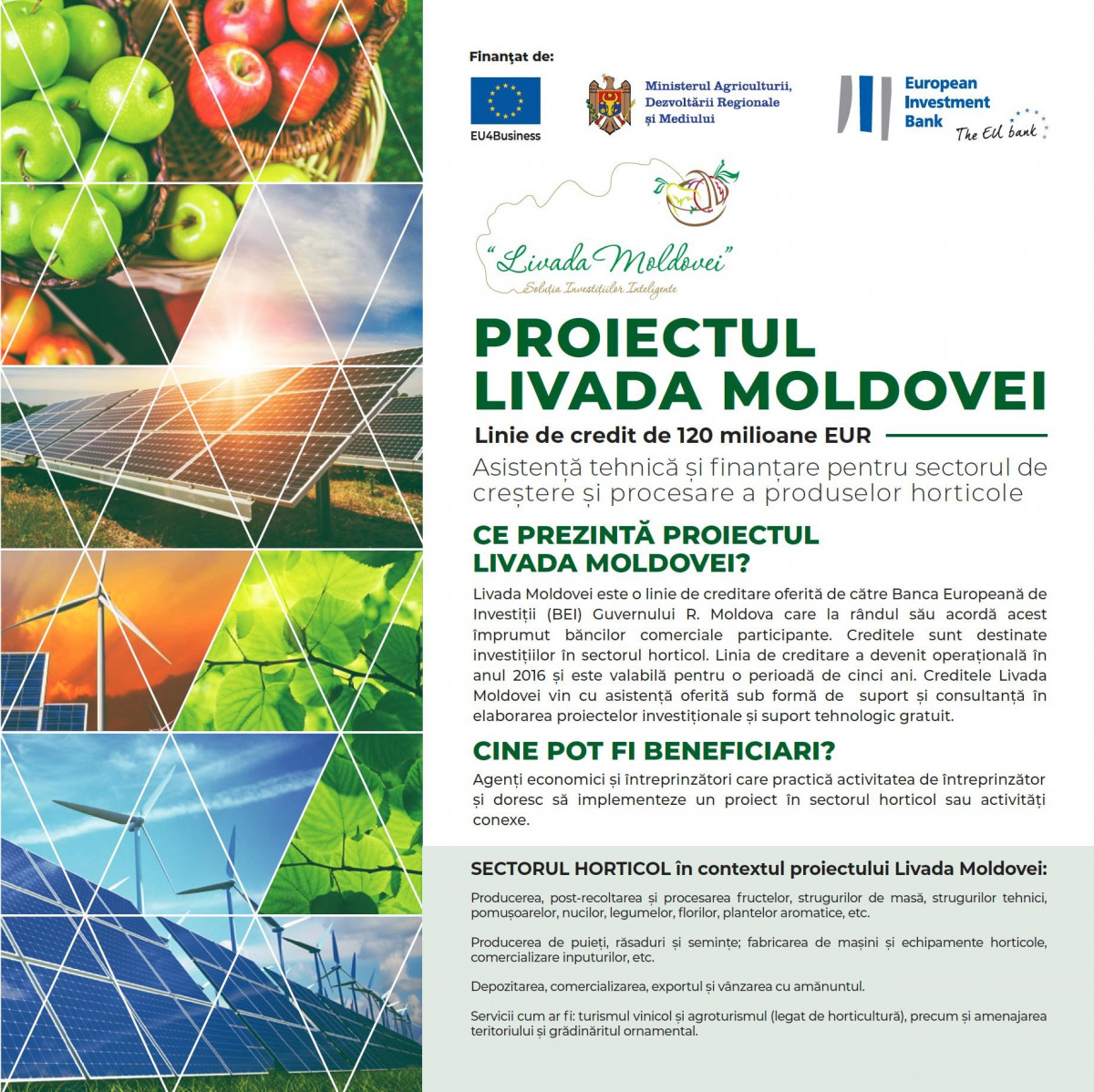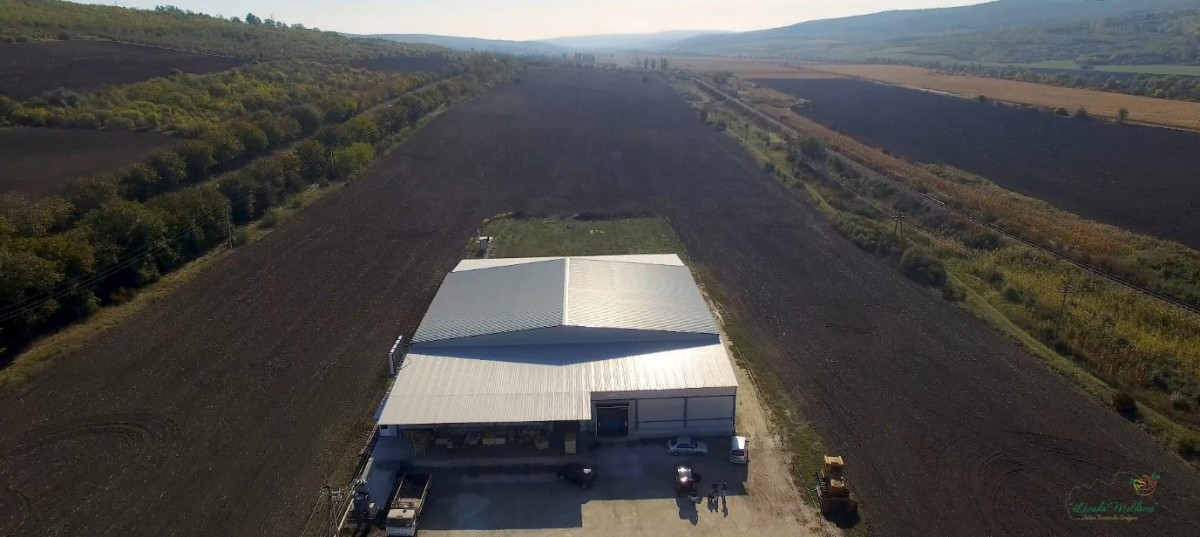
When AFC started the technical assistance for the EIB “Fruit Garden of Moldova” credit operation, solar investments were soon identified as a topic with high potential. AFC brought together the right partners from public and private sector, and fruit producers now start applying for loans for solar investments. The first 100 KW net-metering project on the cold store of the Plamadeala family has just been commissioned.
The production of fruits is the backbone of Moldova’s agriculture. The country produces apples for the Russian market as well as stone fruits and table grapes both for the Russian and the EU markets. A greening strategy for agriculture in Moldova therefore best looks at environmental investments in horticulture that at the same time make production more profitable and reduce vulnerability.
Solar investments produce metaphoric “low-hanging fruits” in horticulture: Photovoltaic (PV) panels power irrigation pumps and cold stores. Both, drip irrigation and cold storage are essential in Moldovan fruit production. Most apple producers harvest directly into cold stores and sell fruits not before January to May when prices tend to be highest. With 0.08 to 0.10 EUR per kg of apples, the cost of cold storage is significant while electricity expenses take the lion’s share.
Moldova has over 600 cold stores which were mapped by AFC, but practically none uses PV panels. When AFC started the technical assistance for “Fruit Garden of Moldova”, EIB’s credit operation for horticulture in the Eastern European country, solar investments were soon identified as a topic with high potential.

It all started with AFC Consultant sensitising cold store operators for solar investments. (Photo: Iurie Virlan, 2018)
However, they do not happen by themselves. A broker like AFC is needed to expose producers to best practices and bring together the right partners to gain momentum for the introduction of renewable energies:
- State bodies like the subsidy agency AIPA and the energy regulator ANRE to provide first-hand information to farmers,
- Commodity associations to reach out to producers,
- EIB and its partnering Moldovan banks to finance investments,
- Independent consultants to advise producers about the suitability of solar investments and facilitate loan application, and
- Local engineering companies with an interest to bring renewable energy generation to another level.

AFC produced this and other leaflets for all EIB partner banks to stimulate solar investments in Moldovan horticulture
In February 2020, just one year after AFC started to deal with solar energy on the frame of “Fruit Garden of Moldova”, the first cold store now received PV panels which were financed by the EIB credit operation. The owner of the cold store, PDG Fruct, is a family business from the village of Pituşca. The Plamadeala family grows plums on 13 ha, apples on 6 ha and strawberries on 5 ha. On the roof of their cold store, the young Moldovan company Zaw Energy now installed 300 poly panels with a total capacity of 100 kW. The turnkey project costed about 80,000 EUR and included the preparation of documents to receive state investment subsidies of nearly half the project costs. The investment will reduce the annual electricity bill by about 11,000 EUR every year over at least 15 years, although the panels come with a 25-year warranty for their efficiency. With the subsidies and due to VAT exemption for EIB financed investments, the payback period of this investment is only 3.5 years. If electricity prices increase over the next years, and this is to be expected as the country is an electricity importer, the annual savings may even grow.
The solar system of PDG Fruct works on a net metering basis: The grid is used as a “battery” when surplus energy is produced. However, altogether this 100 kW installation will only cover up to 35% of the annual energy consumption of the cold store. A capacity increase to 200 kW, which is the maximum allowed by law, is planned for next year.

The cold store of the Plamadeala family prior to the PV installation. The construction of this cold store was one of the first “Fruit Garden of Moldova” projects financed 50% via EIB (Photo: Ciofilm, 2019)
AFC’s role in Moldova as a broker for partnerships not only benefits fruit producers, but also Moldovan solar companies like Zaw Energy for whom this was their first on-grid agricultural project. Two more horticultural companies have already applied for EIB-financed PV projects to be executed by Zaw Energy – and with over 600 cold stores, the future potential is huge. Zaw Energy is a young enterprise that has so far only completed 16 noteworthy projects in Moldova. With their well-educated engineers, the company initially focused on compact hydropower plants, high-voltage substations and large solar projects which are implemented together with their Italian partner in Europe, Central Africa, Central and South America. However, the new constellation in Moldova with state subsidies and EIB-financed loans inspired Zaw Energy to invest time and efforts into developing renewables in their home country, Moldova, where solar investments can produce great returns by a well-positioned fruit industry. On a country level, solar investments will reduce greenhouse gas emissions and dependency on electricity imports. They may be a trigger for improved technical education in Moldova and finally lead to better paid jobs in the country.
For more information on “Fruit Garden of Moldova”, the Plamadeala family and other Moldovan fruit producers, watch this video:
or contact Christoph.Arndt [at] afci.de and Sophia.baumert [at] afci.de.
